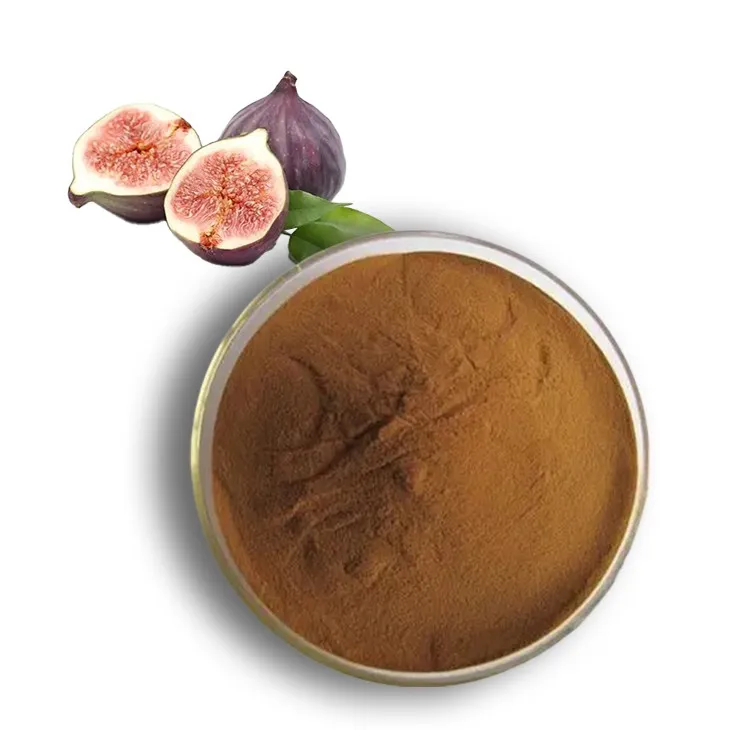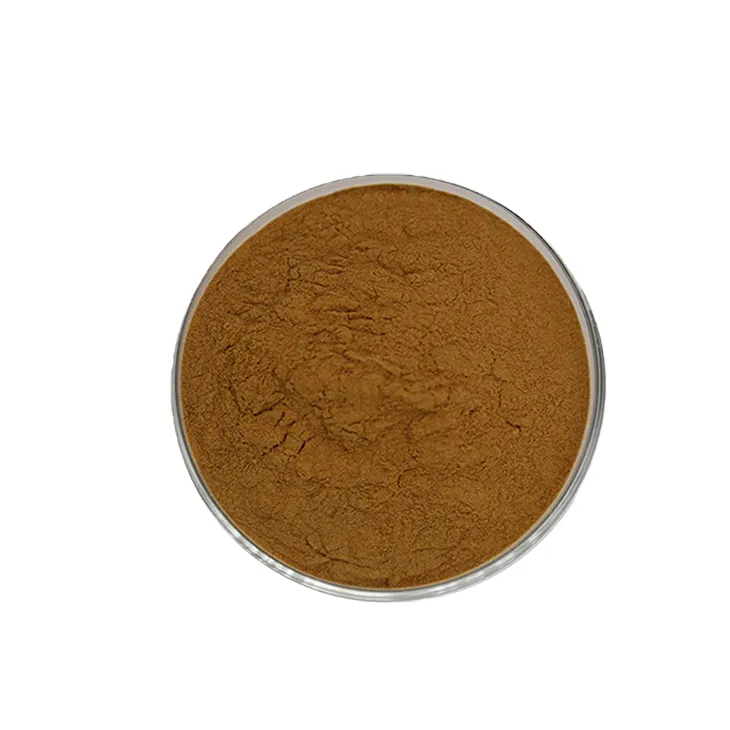- 0086-571-85302990
- sales@greenskybio.com
Fig Extract: Benefits, Uses and Possible Side Effects
2024-11-11

1. Introduction
Figs have been a part of human diet and traditional medicine for centuries. Fig Extract, which is derived from the fig fruit, has recently emerged as a popular ingredient in various products. It is rich in nutrients, bioactive compounds, and antioxidants, which contribute to its potential health - enhancing and skincare properties. However, as with any natural or processed substance, it is important to understand both its benefits and possible side effects before using it extensively.

2. Nutritional Composition of Fig Extract
Fig Extract contains a variety of nutrients that are beneficial for the body. Fiber is one of the main components, which aids in digestion and helps maintain a healthy gut. It also contains vitamins such as vitamin A, vitamin C, and several B - vitamins. These vitamins play crucial roles in maintaining good vision (vitamin A), a strong immune system (vitamin C), and proper energy metabolism (B - vitamins). Additionally, fig extract is a source of minerals like potassium, calcium, and magnesium. Potassium is important for heart health and proper muscle function, while calcium is essential for strong bones and teeth, and magnesium is involved in numerous enzymatic reactions in the body.

3. Health Benefits of Fig Extract
3.1 Digestive Health
The high fiber content in fig extract makes it an excellent aid for digestive health. Fiber adds bulk to the stool, preventing constipation and promoting regular bowel movements. It also acts as a prebiotic, feeding the beneficial bacteria in the gut. This can improve the overall balance of the gut microbiota, which is linked to better digestion, enhanced nutrient absorption, and a stronger immune system. Some studies suggest that fig extract may also help in relieving symptoms of irritable bowel syndrome (IBS), such as abdominal pain and irregular bowel habits.
3.2 Antioxidant Properties
Fig extract is rich in antioxidants, such as phenolic compounds and flavonoids. These antioxidants help to neutralize free radicals in the body. Free radicals are unstable molecules that can cause oxidative stress, which is associated with various chronic diseases, including heart disease, cancer, and neurodegenerative disorders. By scavenging free radicals, fig extract can protect cells from damage, reduce inflammation, and potentially slow down the aging process.
3.3 Heart Health
The potassium content in fig extract can contribute to heart health. Potassium helps regulate blood pressure by counteracting the effects of sodium. High blood pressure is a major risk factor for heart disease, stroke, and other cardiovascular problems. Additionally, the antioxidants in fig extract may help reduce inflammation in the blood vessels and prevent the oxidation of LDL cholesterol (the "bad" cholesterol), which can lead to the formation of plaques in the arteries.
3.4 Blood Sugar Regulation
Some research indicates that fig extract may have a positive effect on blood sugar regulation. The fiber in fig extract can slow down the absorption of glucose in the intestine, preventing rapid spikes in blood sugar levels. This can be particularly beneficial for people with diabetes or those at risk of developing diabetes. However, more studies are needed to fully understand the mechanisms and effectiveness of fig extract in blood sugar control.

4. Uses of Fig Extract
4.1 Skincare
Fig extract has been used in skincare products for its potential benefits. The antioxidants in fig extract can help protect the skin from environmental damage, such as UV radiation and pollution. It may also help reduce the appearance of wrinkles and fine lines by promoting collagen production. Collagen is a protein that gives the skin its elasticity and firmness. Additionally, fig extract has moisturizing properties, which can keep the skin hydrated and prevent dryness.
4.2 Dietary Supplements
As a dietary supplement, fig extract is available in various forms, such as capsules, tablets, and powders. People may take fig extract supplements to support their digestive health, boost their antioxidant intake, or for general well - being. However, it is important to follow the recommended dosage and consult a healthcare professional before starting any new supplement regimen.
4.3 Culinary Uses
Fig extract can also be used in cooking and baking. It can add a unique flavor to dishes, similar to the taste of fresh figs. It can be used in sauces, dressings, desserts, and even savory recipes. For example, it can be added to a salad dressing to give it a sweet and tangy flavor, or used in a cake recipe to enhance the flavor and moisture content.
5. Possible Side Effects of Fig Extract
5.1 Allergic Reactions
Some individuals may be allergic to figs or fig extract. Allergic reactions can range from mild symptoms such as itching, hives, and a runny nose to more severe symptoms like difficulty breathing and anaphylaxis. People with known allergies to figs should avoid using fig extract products. If someone experiences an allergic reaction after using fig extract, they should seek medical attention immediately.
5.2 Gastrointestinal Disturbances
While fig extract is generally beneficial for digestive health, in some cases, it may cause gastrointestinal disturbances. Excessive consumption of fig extract may lead to diarrhea, abdominal cramps, or bloating. This is especially likely if a person has a sensitive stomach or if they consume large amounts of fig extract in a short period of time. To avoid these issues, it is important to start with a small dose and gradually increase the amount if tolerated.
5.3 Interaction with Medications
Fig extract may interact with certain medications. For example, it may interfere with blood - thinning medications, such as warfarin. Since fig extract contains vitamin K, which can affect blood clotting, it may increase the risk of bleeding when taken with blood - thinning drugs. It is crucial for people taking medications to consult their doctor before using fig extract to ensure there are no potential interactions.
6. Conclusion
Fig extract offers a range of potential benefits, from improving digestive health and providing antioxidant protection to being used in skincare and culinary applications. However, it is not without possible side effects. Allergic reactions, gastrointestinal disturbances, and interactions with medications are some of the factors to be aware of. As with any natural product, it is important to use fig extract in moderation and consult a healthcare professional if there are any concerns or pre - existing medical conditions. By understanding the benefits, uses, and possible side effects of fig extract, individuals can make more informed decisions about whether to incorporate it into their diet, skincare routine, or other aspects of their lifestyle.
FAQ:
What are the potential health benefits of fig extract?
Fig extract may have several potential health benefits. It is rich in nutrients such as vitamins, minerals, and fiber. Some studies suggest that it may have antioxidant properties, which can help protect the body's cells from damage caused by free radicals. It may also aid in digestion due to its fiber content, potentially helping to prevent constipation and promote a healthy gut. Additionally, there are indications that it could have anti - inflammatory effects, which may be beneficial for various inflammatory conditions.
How can fig extract be used in skincare?
In skincare, fig extract can be used in multiple ways. It may be included in moisturizers, creams, and lotions. The antioxidants in fig extract can help combat skin aging by reducing the damage from environmental factors like UV rays. It may also have moisturizing properties, helping to keep the skin hydrated. Some skincare products with fig extract claim to improve skin texture and complexion, perhaps due to its nutrient - rich nature.
What are the possible side effects of fig extract?
While fig extract is generally considered safe for most people, there are some possible side effects. Some individuals may be allergic to figs, and in such cases, using fig extract can lead to allergic reactions such as skin rashes, itching, or swelling. Ingesting large amounts of fig extract may also cause digestive issues like diarrhea, especially if a person has a sensitive stomach. Additionally, if fig extract is used in skincare products, it may cause skin irritation in some people with very sensitive skin.
Is fig extract used in health supplements? How?
Yes, fig extract is used in health supplements. It can be found in supplement forms such as capsules or tablets. In these supplements, fig extract is typically used to provide the potential health benefits it offers. For example, to boost the antioxidant intake, aid digestion, or potentially support overall health. The recommended dosage usually depends on the specific product and the intended use, and it is important to follow the instructions provided on the supplement packaging.
Can fig extract help with weight loss?
There is some potential for fig extract to be associated with weight loss. Its fiber content can help increase feelings of fullness, which may lead to reduced calorie intake. However, it is not a magic solution for weight loss. A balanced diet and regular exercise are still the mainstays of any successful weight - loss plan. Fig extract can be a part of a healthy lifestyle that includes proper nutrition and physical activity, but it should not be solely relied upon for significant weight loss.
Related literature
- The Nutritional and Medicinal Properties of Figs: A Review"
- "Fig Extract in Skincare: Efficacy and Safety"
- "Potential Health Benefits and Risks of Fig - based Supplements"
- ▶ Hesperidin
- ▶ citrus bioflavonoids
- ▶ plant extract
- ▶ lycopene
- ▶ Diosmin
- ▶ Grape seed extract
- ▶ Sea buckthorn Juice Powder
- ▶ Beetroot powder
- ▶ Hops Extract
- ▶ Artichoke Extract
- ▶ Reishi mushroom extract
- ▶ Astaxanthin
- ▶ Green Tea Extract
- ▶ Curcumin Extract
- ▶ Horse Chestnut Extract
- ▶ Other Problems
- ▶ Boswellia Serrata Extract
- ▶ Resveratrol Extract
- ▶ Marigold Extract
- ▶ Grape Leaf Extract
- ▶ blog3
-
Cranberry Plants and Skin - care Products.
2024-11-11
-
Yam Extract
2024-11-11
-
Feverfew Extract
2024-11-11
-
Shikonin
2024-11-11
-
Marigold Extract
2024-11-11
-
Mulberry leaf Extract
2024-11-11
-
Chia Seed Powder
2024-11-11
-
Saw Palmetto Extract
2024-11-11
-
Chasteberry Extract
2024-11-11
-
Reishi mushroom extract
2024-11-11
-
Troxerutin
2024-11-11





















